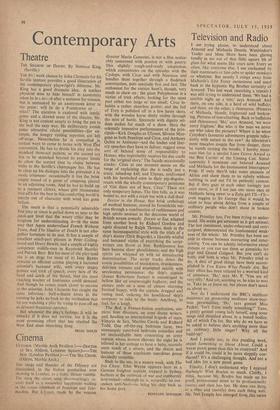Contemporary Arts
Theatre
Tim first work chosen by John Clements for his Saville venture provides a good illustration of the contemporary playwright's dilemma. Mr. King has a good dramatic idea. A nuclear physicist tries to hide himself in anonymity when he is r.leaczd after a sentence for treason, but is unmasked by an anonymous letter to the press: will he do a Pontecorvo or . . . what? The question is explored with intelli- gence and a shrewd sense of the theatre; Mr. King is not content simply to bring the pot to the boil the easy way. He deliberately avoids some attractive cliché possibilities—for ex- ample, the hungry visiting reporters are left off-stage. Nevertheless he is compelled in certain ways to come to terms with West end convention. He has to divide his play into the standard three-act pattern; so the second act has to be stretched beyond- its proper limits to allow the correct time to elapse between visits to the Saville's champagne bar. He has to chop up his dialogue into the prevalent a la mode crispness: occasionally it has the brisk empty sound of a game of pingpong played in an adjoining room. And he has to build up to a resonant climax, whose glib reassurance that all's for the best in this comforting world is utterly out of character with what has gone before.
The result is that a potentially admirable first play at times is pulled down so near to the stock-pot level that the weary critic may be forgiven for underestimating it—in the same way that Agate undervalued French Without Tears. And The Shadow of Doubt is not alto- gether fortunate in its cast. It has a couple of excellent small-part players in Peter Colling- wood and Henry Hewitt, and a couple of highly competent middle-men in Raymond Huntley and Patrick Barr. But for most of the play (and she is on stage for most of it) Jane Baxter remains an efficient actress playing a harassed scientist's harassed wife, with every stagey gesture and trick of speech, every turn of the head and catch of the throat, that the most exacting teacher of histrionics could demand. And though he comes much closer to success is the scientist, John Clements has caught the same infection : half-a-dozen times in the evening he jerks us back to the realisation that we are watching a play by trying to pass off on us debased theatrical currency.
But whatever the play's failings, it will be unlucky if it does not survive, for it is the most promising effort that has reached the West End since Marching Song.
BRIAN INGLIS


































 Previous page
Previous page